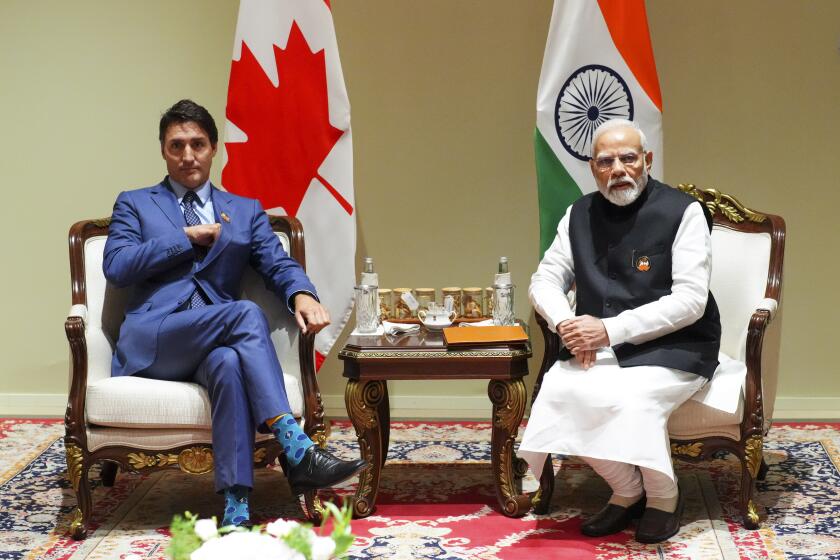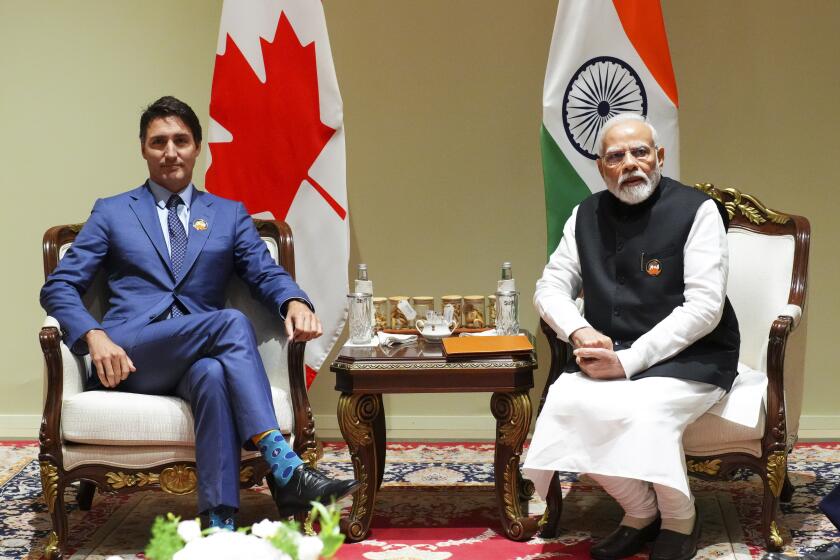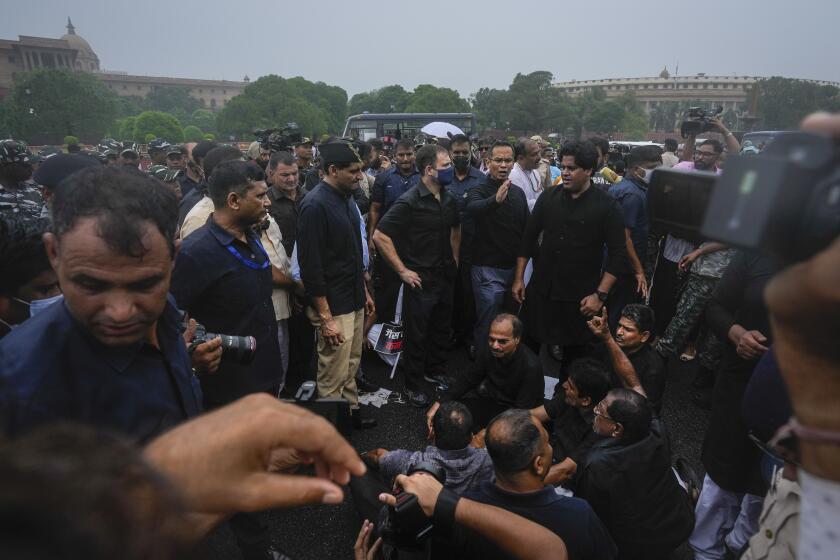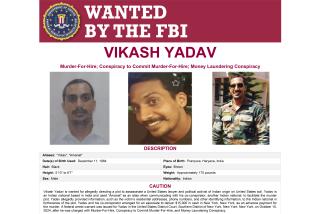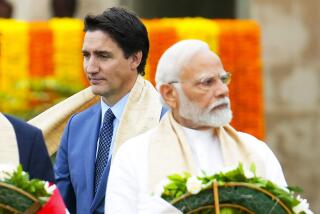Surveillance of Indian diplomats led to claims over Sikh’s slaying, Canadian official says
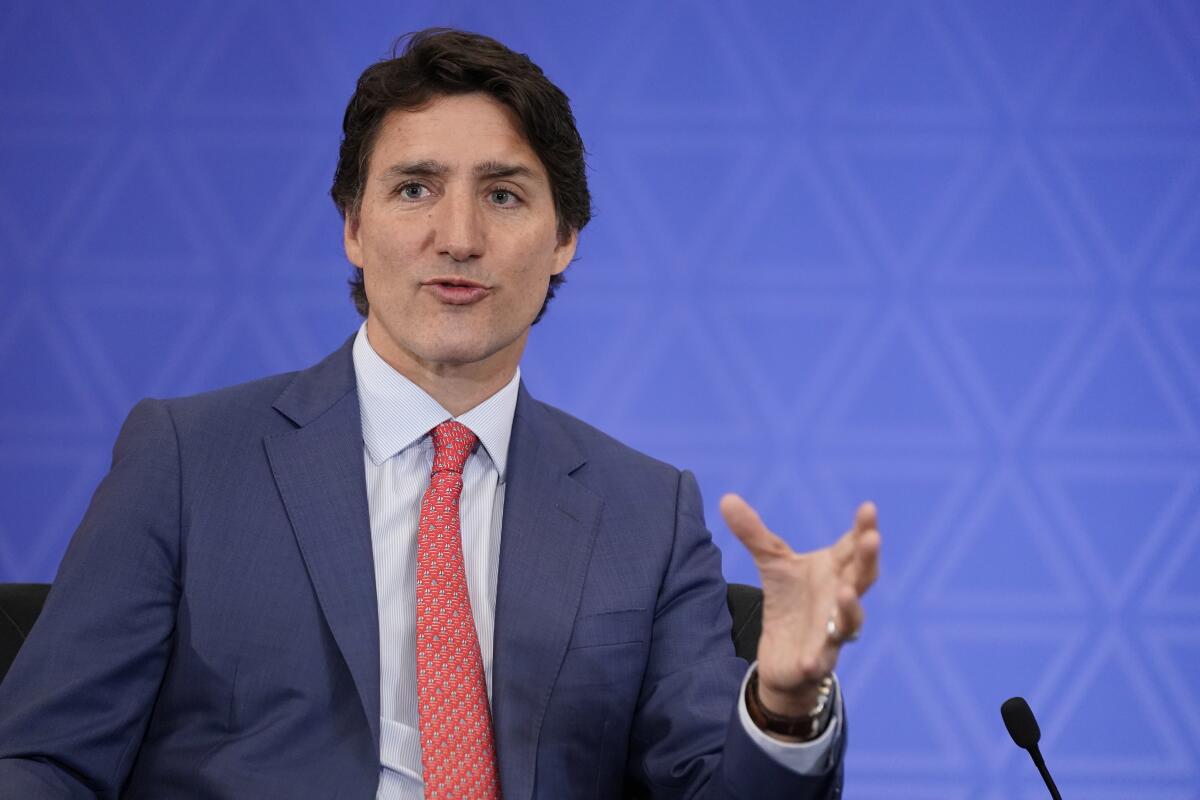
- Share via
TORONTO — The allegation of India’s involvement in the killing of a Sikh Canadian is based on surveillance of Indian diplomats in Canada, including intelligence provided by a major ally, a Canadian official told the Associated Press on Thursday.
The official said that the communications involved Indian officials and Indian diplomats in Canada and that some of the intelligence was provided by a member of the “Five Eyes” intelligence-sharing alliance, which consists of the U.S., Britain, Australia, New Zealand and Canada.
The official did not say which ally provided intelligence or give details of what was contained in the communications or how they were obtained. The official spoke on condition of anonymity because they were not authorized to discuss the matter publicly.
The Canadian Broadcasting Corp. first reported the intelligence.
The revelation came as India stopped issuing visas to Canadian citizens and told Canada to reduce its diplomatic staff in India as the rift widened over allegations by Prime Minister Justin Trudeau of suspected Indian involvement in the killing of Hardeep Singh Nijjar, a 45-year-old Sikh separatist, in British Columbia, Canada.
After its explosive allegation of possible Indian involvement in the killing of one of its citizens, Canada receives only muted support from allies.
Ties between the two countries have plunged to their lowest point in years after Trudeau told Parliament on Monday that there were “credible allegations” of Indian involvement in Nijjar’s fatal shooting.
Nijjar, a plumber who was born in India and became a Canadian citizen in 2007, had been wanted by India for years before he was gunned down in June outside the temple he led in Surrey, a suburb of Vancouver.
Speaking Thursday on the sidelines of the United Nations General Assembly, Trudeau acknowledged the complicated diplomatic situation.
“The decision to share these allegations on the floor of the House of Commons was not done lightly,” he said. “There is no question that India is a country of growing importance and a country that we need to continue to work with.”
“We are not looking to provoke or cause problems, but we are unequivocal around the importance of the rule of law and unequivocal about the importance of protecting Canadians.”
India has advised its citizens to be careful when traveling to Canada as a rift between the two nations widens further.
The bombshell allegation set off an international tit-for-tat, with each country expelling one of the other’s diplomats. India called the allegations “absurd.”
Canada has yet to make public any evidence to back Trudeau’s allegations, and Canada’s ambassador to the U.N., Bob Rae, indicated that that might not come soon.
“This is very early days,” Rae told reporters Thursday, adding that the facts will emerge but must “come out in the course of the pursuit of justice.”
“That’s what we call the rule of law in Canada,” he said.
Meanwhile, the company that processes Indian visas in Canada announced that services had been suspended. Canadians are among the top travelers to India, with 277,000 Canadian citizens visiting the country in 2022, according to India’s Bureau of Immigration.
Indian External Affairs Ministry spokesperson Arindam Bagchi blamed the visa suspension, which includes visas issued in third countries, on safety issues.
“Security threats being faced by our high commission and consulates in Canada have disrupted their normal functioning,” Bagchi told reporters. He gave no details on the alleged threats.
Start your day right
Sign up for Essential California for the L.A. Times biggest news, features and recommendations in your inbox six days a week.
You may occasionally receive promotional content from the Los Angeles Times.
The announcement quickly rippled across Canada, especially among people with ties to India.
Maitreyi Bhatt, a 27-year-old Indian citizen whose partner is Canadian and needs a visa, was distraught because their wedding was scheduled for late October in India, where he was to meet her family for the first time.
“I’ve been crying all day,” she said. “It’s so difficult. I was just so excited for him to meet my family.”
She said the venue is booked and the couple has nonrefundable flights. She said her partner went to the Indian Consulate in Toronto but was escorted out by security.
Since its independence in 1947, India has transformed from a poverty-stricken nation into one of the world’s fastest-growing economies.
“People like me are just caught up in this, and it’s just not fair,” she said.
The Canadian High Commission in New Delhi said Thursday that its consulates in India were open and continue to serve clients. It said some of its diplomats had received threats on social media, and that Canada expects India to provide security for Canadian diplomats and consular officers working there.
India has criticized Canada for years over giving free rein to Sikh separatists, including Nijjar. New Delhi had accused him of links to terrorism, which he denied.
Nijjar was a local leader in what remains of a once-strong movement to create an independent Sikh homeland known as Khalistan. A bloody Sikh insurgency shook north India in the 1970s and 1980s until it was crushed in a government crackdown in which thousands of people were killed, including prominent Sikh leaders.
At the time of his killing, Nijjar was working to organize an unofficial Sikh diaspora referendum on independence from India.
More to Read
Sign up for Essential California
The most important California stories and recommendations in your inbox every morning.
You may occasionally receive promotional content from the Los Angeles Times.
